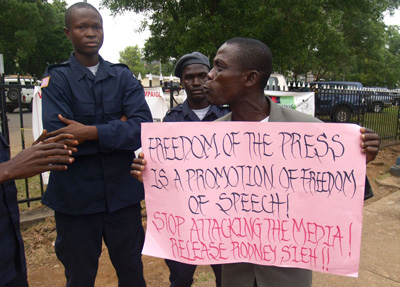During Liberia’s 14-year civil war, the press was silenced through violence. Journalists now say they are the victims of a more subtle assault. They say a corrupt judiciary and a vindictive use of libel suits are a threat to an otherwise burgeoning free press.
According to the U.S. State Department’s 2010 Human Rights Report on Liberia, “Defense attorneys and prosecutors sometimes suggested that defendants pay a gratuity to appease judges, prosecutors, jurors, and police officers or to secure favorable rulings from them.” The lack of successful prosecution in corruption cases and the heavy fines imposed in libel suits have created a culture of self-censorship when reporting on corruption and official misconduct.
The most recent victim of this phenomenon is FrontPage Africa, Liberia’s most widely circulated newspaper, which was sued last year by former Agriculture Minister Chris Toe after the paper suggested Toe had misappropriated money. Toe later resigned his post. In February, a unanimous jury ruled that FrontPage Africa was guilty, ordering the paper to pay US$1.5 million in damages, a sum that would effectively shut it down. (For now, the paper continues to publish.)
Rodney Sieh, FrontPage‘s editor-in-chief, refused to appeal the decision, claiming that with corrupt jurors and a biased court he had no hope of a better outcome. “It doesn’t help us to keep wasting money and resources,” says Sieh, who said he has spent US$10,000, and months of court appearances, fighting the charges. “We’re daring them to shut us down.” Sieh says someone representing Toe approached him asking for a US$25,000 out-of-court payment to settle the case. “I’m not going to pay a penny,” Sieh said he told the representative.
FrontPage Africa reported that, during the trial, prosecution lawyers bribed at least two jurors, one of whom signed an affidavit claiming she received US$2,500 in exchange for a guilty verdict.
“You had a case where a juror said they were bribed,” Sieh said. “You had an opposition lawyer talking to one of the jurors outside the court. The judge allowed the case to go on. In any other country it would have been thrown out. It’s frustrating.”
In January, Sieh was incarcerated for contempt of court in an unrelated case. FrontPage Africa had published a letter to the editor claiming a Supreme Court judge was biased during a criminal case. When summoned for questioning, he was found in contempt and sentenced to 30 days in jail and a fine. He was released two days later after President Ellen Johnson Sirleaf intervened.
Rival paper the New Democrat is also battling a libel suit from opposition candidate Simeon Freeman. Freeman alleges that in 2010, a story that ran in the paper portrayed him as incompetent. In the story, the paper criticized a deal, citing a General Auditing Commission report, in which Freeman, a satellite television mogul, received a US$900,000 government contract to import road equipment that was never used.
Unlike Sieh, Kamara has appealed the decision to the Supreme Court. He was told by his lawyers that if he paid US$15,000 he’d get a favorable ruling, something he refused to do. “The case is clear–in libel you have to prove malice or reckless disregard for the truth,” Kamara said.
Kamara believes that libel is a new form of manipulation that powerful Liberians employ to control what’s reported. “Under the military regime and under Charles Taylor, there was so much suffocation of media freedom, they’d either come and close you down or burn the place down. But now with international focus on this government, you can see the manipulation of the media to be seen operating within the confines of the law.” In 1996, the offices of New Democrat were burned down by Taylor’s forces and Kamara fled the country to Ghana.
Since Sirleaf’s democratic election in 2005, which ended a decade of war, not a single newspaper has won a libel case.
“Should journalists be made to account for their reckless actions? Yes, they should,” Press Union of Liberia president Peter Quaqua said in a recent speech. “But when public officials who are entrusted with public authority and resources including the president of the republic, who is protected by law from suits, decide to sue a journalist, we think it is nothing more than intimidation.”
Last year, the New Broom newspaper shut down after losing a US$5 million libel suit brought by Sirleaf.
Sieh thinks libel should be used to curb irresponsible reporting. But he thinks public actors should also learn to embrace criticism. “If you’re in public office, you should be able to take criticism, no matter what form it comes in,” he said. “A lot of times I’ve noticed this government is not being tolerant, and that’s a bad sign for any democracy.”
Aaron Leaf was a media trainer in Monrovia with Journalists for Human Rights. Emily Schmall is country director for New Narratives, a mentorship program for young female journalists in Liberia.
